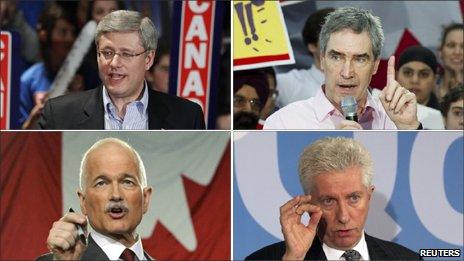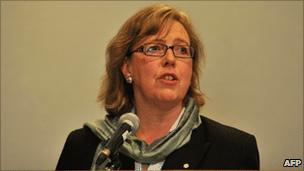Canada leaders' debate may spice up campaign
- Published

(Clockwise from top left) Mr Harper, Mr Ignatieff, Mr Duceppe and Mr Layton are to debate on Tuesday evening
The leaders of Canada's four main political parties will take part in the first of two televised debates on Tuesday evening, with opposition leaders likely to focus on new allegations of spending mismanagement aimed at the incumbent Conservatives.
The issue has injected a spark of interest into a campaign many observers say has been lacklustre, as Canadian voters prepare to head wearily to the polls on 2 May for the fourth time in seven years.
The election was triggered by a non-confidence vote in Canada's parliament, which came after Prime Minister Stephen Harper's minority government was criticised for failing to provide details about several controversial areas of spending, including the budget for new fighter jets.
Spending questions seemed to dog Mr Harper's Conservatives again this week.
A leaked auditor general's draft report on last summer's G8/G20 summit in Canada alleged the government spent millions of dollars on dubious projects and that parliament was "misled" about the spending.
The Conservatives have dismissed the allegations, insisting that the final report will be less damning, and Auditor General Sheila Fraser has said she will not release the final report until after the new parliament is seated.
Nevertheless, the controversy has put Mr Harper's campaign on the defensive heading into the debate.
The leader of the main opposition Liberal Party, Michael Ignatieff, will almost certainly seize on the allegations to cast the Harper government as untrustworthy.
Questions of honesty
But Mr Ignatieff also has a lot to prove in the debates, as the only one of the four leaders fighting an election for the first time. And Conservative advertisements attacking the patriotism of the Liberal leader, who spent much of his career away from Canada, appear to have had some success.
Despite an energetic campaign, the author and former political commentator has made little headway in opinion polls, with his party trailing the Conservatives by 8.5 points in a Nanos Research poll, external released on Tuesday.
Allan Bonner, a Toronto-based political consultant, said Mr Ignatieff had to seize the opportunity in the debates to demonstrate that he has leadership qualities and to use the auditor general's report as a "springboard" to raise questions in voters' minds about the Conservatives' honesty and spending.
"He needs to show a broader performance, a deeper knowledge of the issues, maybe deliver some soaring rhetoric," Mr Bonner said.
Buoyed by what Mr Bonner calls "the power of incumbency", the technocratic Mr Harper has run a cautious, tightly controlled campaign, promising to give a boost to retirement savings accounts and to eliminate the country's budget deficit by 2014.
"He's selling himself as a good and diligent but rather dour manager," Mr Bonner said. "We have seen the range of emotions from Stephen Harper running all the way through from L to M in the alphabet and that's probably what we're going to see in the debate."
Jockeying for position
New Democratic Party (NDP) leader Jack Layton and Gilles Duceppe, who heads the Quebec nationalist party Bloc Quebecois, will also be jockeying for position at the debates.

The Green Party, led by Elizabeth May, was not invited to take part in the televised debates
Controversially, the Green Party, led by popular leader Elizabeth May, has been excluded from the forum.
Mr Layton, who has recently recovered from a hip operation and a brush with cancer, has conducted a feisty and passionate campaign, promising among other things to secure long-term funding for the country's public healthcare system by increasing corporate taxes.
But the latest polling by Nanos Research shows NDP support falling to 16.8% from a high of 19.9% on 15 March.
National Post political columnist John Ivison said the Liberals were trying to take advantage of the crowded and divided opposition to attract leftist New Democrat voters.
"Their platform is becoming virtually identical to the NDP's," he said. "There's a lot of promises of money for childcare, family care and post-secondary education - all the things NDP voters care about."
Toronto swing
Mr Ivison also said Canada's largest metropolitan area was a key battleground in the Conservatives' much-vaunted quest to form a majority, after heading a minority government since 2006.
Toronto is the country's commercial and financial capital, with a diverse population of more than 5.1 million in the metropolitan area.
The city has long been a stronghold for the federal Liberals, who traditionally have been supported by immigrant and ethnic groups.
But with the election of a populist right-leaning mayor and shifting voter allegiances, Mr Ivison says the Liberals can no longer take ethnic and immigrant voters for granted.
In particular, backing for the Conservatives' supportive Israel policy by the large Jewish communities in York Centre and Eglinton-Lawrence on the northern edge of Toronto could swing the vote, Mr Ivison says.
Hockey schedule
In addition, Canada's large Chinese community in Toronto and in Vancouver in the west is similarly impressed by Mr Harper's pro-business stance and his government's 2006 apology for a discriminatory head tax imposed on Chinese immigrants to Canada between 1885 and 1923, Mr Ivison says.
But for all the political parties, voter apathy will be a major problem unless an event like the leaders' debate can breathe life into a listless campaign.
Rex Murphy, one of Canada's best known TV and radio political commentators, said the election had been fought over trivial matters rather than substantive issues - the format of the debate and Mr Ignatieff's political style, for example, rather than the global economy, Japan, Libya and energy policy.
And as if to illustrate the lack of voter interest, the French-language debate was rescheduled to Wednesday from Thursday to avoid conflicting with the start of the National Hockey League play-offs, a game between the Montreal Canadiens and the Boston Bruins.
"All the things of substance and count are evacuated from this campaign," Mr Murphy said. "It's a battle of shadows."
- Published5 April 2011
- Published8 April 2011
- Published1 April 2011
- Published27 March 2011